Documentary maker Charlotte Devlin, who grew up in Dublin and has lived in Lyon, France for the past 16 years, writes for RTE Culture about her new Documentary On One production, Felix – Life And Limb. Listen to it above, and read all about it below...
On January 12th 2021, my Icelandic friend Felix Gretarsson finally received the telephone call he's been waiting on for years, a suitable donor has been found! And he needs to get to the hospital in the next hour, to prepare for a pioneering transplant surgery, which will completely transform his life.

Last year I told the first part of Felix’s fascinating story in a Documentary On One production called Felix. It’s a story that began 23 years ago, on exactly the same date - 12th January 1998, one dark frozen winter morning in Iceland. Felix, then 26 years old, was working as a maintenance electrician on the outskirts of Reykjavik, when he accidently grabbed onto a ‘live’ high voltage power line. The 11,000 volt shock he received immediately set his arms on fire and flung him to the icy ground eight metres below, breaking his back in two places, as well as his neck and lots of other bones.
Lucky to be alive, three months later Felix woke up in hospital and both of his arms had been amputated. Since that day he has been chasing a ‘seemingly’ impossible dream to be a ‘whole’ human being again.
Almost ten years later, a chance meeting with pioneering French, hand transplant surgeon, Dr Jean-Michel Dubernard, who happened to be lecturing in Reykjavik, started the ball rolling. Their meeting and the simple question that Felix asked the surgeon ‘Do you think that the day will come when you can transplant ‘whole' arms ?’ was the beginning of what turned out to be a 14-year process.
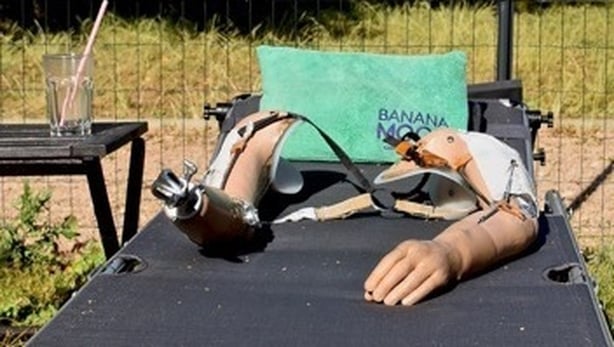
Four years of debate later, French surgeons agreed to do the surgery and Felix’s dream to have a double arm transplant started to take shape. (Dr Dubernard retired and the surgeon who took over and now heads up Felix’s transplant team is Dr Aram Gazarian. Sadly, earlier this year Dr Dubernard suddenly passed away at the age of 80, (he had visited Felix and his new arms in hospital just a couple of months previous).
In 2013 Felix and his Mum moved to Lyon, France, to wait while the 50 strong medical team prepared and practiced for the transplant surgery. It was at this time that I met and became good friends with the very charismatic Felix and his upbeat family. Three years later in 2016, when the medical team were happy everything was in place, the search for a suitable donor began, (it would take five years!). Waiting to find a donor is where we left the story in June 2020, with me promising to follow any developments, little did I know what was waiting just around life’s corner.
Documentary On One: Felix – Life And Limb returns to Felix’s story just months later, on the day he receives the life-changing call that a donor has been found and follows in real-time what happens next. The story hits the ground running with the rush to get to the hospital, where 4 teams of surgeons and a huge medical team prepare for the operation and where the donor awaits on life support, and it picks up speed from there. The pioneering transplant surgery takes 15 hours, and is followed by Felix’s nightmarish first days waking up in ICU, the excruciating pain, and the sheer joy of being a ‘whole’ human being again as the roller coaster recovery ride begins.
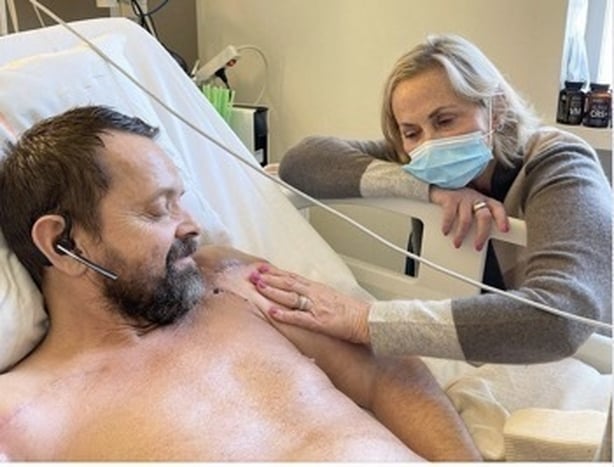
It turns out that during the surgery there were a couple of unexpected complications. The most worrisome being the poor condition of Felix’s nerve endings, which made connecting them to the donor’s nerves, more complicated than anticipated. If the repairs between the nerves don’t succeed, there may be no movement and no feeling in the new arms, only time will tell.
Although the new arms look the part and Felix is thrilled to look at himself in the mirror and see himself ‘whole’ again, they don’t actually work yet. When they are not supported by the customised sling, they just hang lifelessly from his body. It will take be at least nine months and lots of rehab before there is any measurable improvement. At best, the functionality of his new arms will be very limited. As Chief Surgeon, Dr. Aram Gazarian said at the news conference, announcing the double arm transplant to the world "giving a little to somebody who was missing so much, is already a lot."
Even though Felix has put everything on the line to have this transplant surgery, he knows the results if any, will be limited. This is experimental surgery. The surgery will be seen as a success if Felix can bend and flex his elbow. Being able to do this would be a life-changer for Felix. Anything above that will be a bonus. The expectation for his new hands and fingers to work, are very slim.
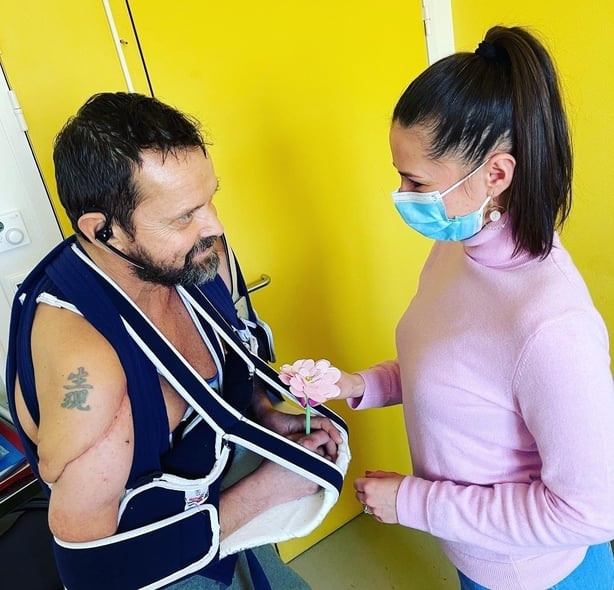
I’m always so impressed by Felix’s courage and determination, as he says ‘nobody is going to survive this life, we all die at the end and I rather take the risk of dying doing something that I believe in, then just hanging there afraid to try anything’
As if things aren’t precarious enough already, the threat of Felix’s body rejecting the donor arms is always lurking in the background. To reduce the possibility of rejection, all transplant recipients must take immunosuppressants (anti-rejection medicine) every day, for the rest of their lives. There are two types of rejection; acute rejection and chronic rejection. Acute rejection is expected in the first few months after transplantation, it can be managed and resolved with special creams and intravenous steroids. Chronic rejection is much more serious. For some reason unknown to medics, the body manages to reject the transplant, despite the immunosuppressants and there is nothing that can be done. Chronic rejection can happen at any time, months or even years after the transplant. If this happens to Felix, both arms will need to be amputated.
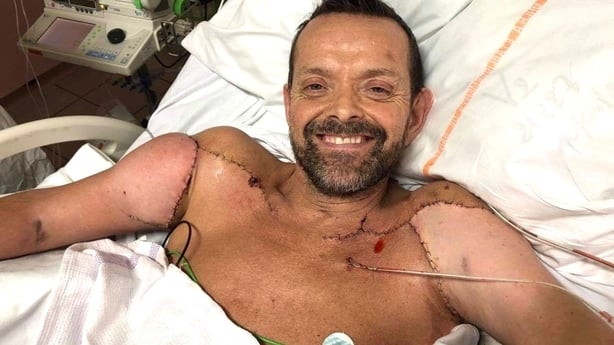
Seven weeks after the operation when Felix is stable and his wounds have healed well-enough, he moves to rehab and the three year intensive rehabilitation phase begins. Although Felix is meant to be an in-patient at rehab for the first two to three months, after six weeks he manages to successfully push to become an out-patient. Getting to be at home with his wife, Sylwia and his Mum, Gulla, his dogs and his own bed, is a real game changer for him. Of course this means a lot of new challenges for Sylwia and Gulla looking after him at home, but every day things get a little easier. Felix couldn’t ask for better people around him-they are fantastic and always so upbeat!
As an out-patient, Felix drives himself to rehab five days a week and this will be his routine for at least two years. Recovering feeling and movement in his new arms will be a long, slow process. How much feeling and movement he recovers, if any, will depend on the speed that his nerves grow down into the arms. Once that happens, tiny nerves branch out into the muscles, tendons, veins and skin, to carry the signals from his brain to feel and move. Nerves grow at the same speed as hair, 1mm a day! There is a huge sigh of relief three months after the surgery, when nerve-growth becomes evident in both of the arms, and it’s actually four times faster than anticipated, 4mm per day!
Listen to Charlotte Devlin's previous Documentary On One about Felix
Nerves grow from the shoulders down. The speed of nerve growth is crucial, as Felix’s lower arms and hands are deteriorating while they wait for the new nerves to reach them. Parts of the arm where the nerves haven’t reached within a year, will likely be too atrophied to recover. At rehab, physiotherapists concentrate on keeping Felix’s arms and hands moving, to minimize the deterioration before the new nerves grow in. And they use techniques to stimulate nerve growth and the neurological connections, between his brain and the new arms.
Four months in, there is astonishment when Felix actually begins to slightly flex one of his biceps. There is a huge mountain to climb, but this is such an encouraging first sign of what’s to come. But it’s two steps forward and one back…while his nerves are growing at four times the speed anticipated! Felix is showing signs of acute rejection for the second time, but he’s not worried about it, as he says if his doctors aren’t worried, there is no reason for him to worry.
Throughout all of this, Felix is his usual upbeat self. His faith, determination, courage, resilience, and great sense of humor are always evident and inspirational. He wouldn’t be able to do any of this without the dedication and support of his wife and mum here in Lyon, his friends and the encouragement of his loved ones in Iceland.
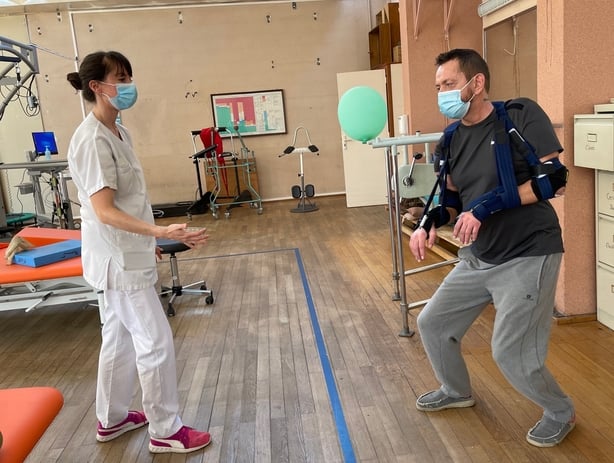
By September 2021, it's eight months in and Felix’s continues to work hard in rehab and is defying all of the expectations. His bicep flexing is becoming more pronounced and he has just started flexing the bicep on his left arm now. All positive signs that his nerves are growing and branching out. He won’t be playing the piano any time soon, but he’s thoroughly enjoying his new arms and the simple pleasures they bring… like holding his wife’s hand, hugging his daughters and the grandkids (who finally got to visit him in Lyon last month). And taking a dip in the pool by his apartment as a 'whole’ human being.
